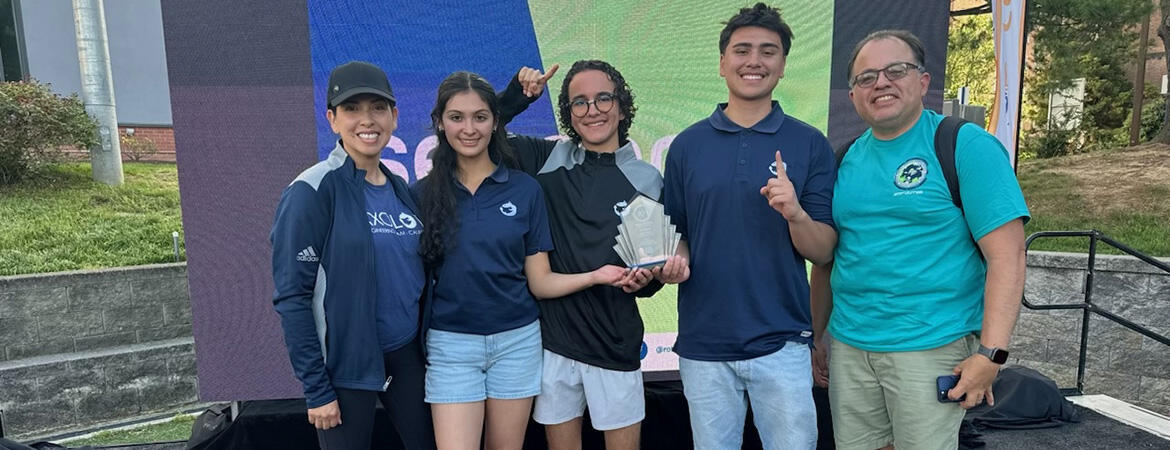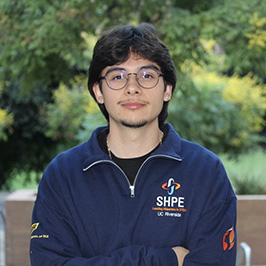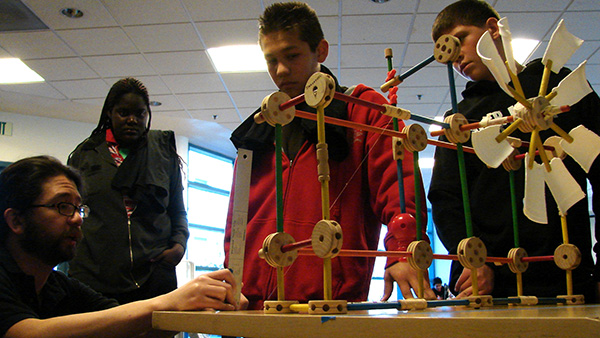
When Juan Ascencio-Martinez was in high school, going to college or studying engineering weren’t on his radar. No one in his family had ever gone to college. He wasn’t encouraged to think about a career in science, technology, engineering, and mathematics (STEM).
A UC Riverside (UCR) program that works closely with the Marlan and Rosemary Bourns College of Engineering (BCOE), changed all that. While still in high school, Ascencio-Martinez participated in the Mathematics, Engineering, and Science Achievement (MESA) program. The program is geared to help educationally underserved students — such as those from first-generation Hispanic/Latino households — excel in math and science and pursue degrees in STEM fields, such as engineering.
His MESA experiences had a significant impact, and Ascencio-Martinez is now a successful BCOE mechanical engineering major. He also works part-time as a MESA academic and STEM mentor and was chosen for the University Honors program, which is a selective academic and enrichment program for high-achieving undergraduate students.
“I learned that college was a realistic option for me,” Ascencio-Martinez said. “My MESA teacher, Mr. Thompson, was always there for me when I had questions and ensured that every student got the most out of the program, encouraging my classmates and me to pursue those STEM opportunities.”
Ascencio-Martinez’s story is one of thousands of students’ experiences over MESA’s 26-year history at UCR.
MESA creates pathways to future innovation, to STEM, and to college, said Carlos Gonzalez, MESA’s director and a curriculum specialist for the state-level California MESA.
“It opens those doors,” he said. “MESA opens doors for students who might not even be aware that those doors would open for them,” he said.
MESA targets two broad categories of students. First, the program aims to make middle and high school students from participating districts more aware of the opportunities that await them in pursuing STEM degrees and careers. Even just basic awareness can be profound, Gonzalez said. This is especially true for students from families without college graduates or STEM professionals.
“For some kids, there is no awareness at all,” Gonzalez said. “It really is another world for them. We show them that there are other possibilities. It changes how they look at academics.”
Students get a taste of engineering and other STEM fields through a dedicated MESA class and teacher on their school campus, specially designed curricula, hands-on engineering projects, and visits to the UCR campus.
School districts that participate in MESA include those in neighboring cities such as Moreno Valley, Perris, Menifee, Palm Springs, Yucaipa, Colton, Rialto, Ontario, and other communities in Riverside and San Bernardino counties. MESA also prepares community college students to transfer successfully to four-year institutions.
“We’re building these bridges, that’s what we are doing,” Gonzalez said. “From where students are currently to where they could potentially be.”
A memorable bridge-building moment came to Ascencio-Martinez when he was a senior at Rialto High School, when he and his MESA team were tasked with building a sunlight-powered watercraft, a solar boat, from concept to completion.
“Throughout the building process and the competition, I developed strong bonds with fellow MESA students and gained fundamental hands-on skills for engineering,” he said. “I value that MESA emphasizes teamwork and connection-building as I still keep in touch with several of those students today.”
BCOE undergraduate students and other UCR STEM students also benefit from academic support services and career-mapping provided by MESA. These support services include career counseling, connecting students with alumni, professional development events, funding to attend educational conferences, and other activities.
UCR’s MESA program has served 24,000 middle and high school students since 1999, Gonzalez said. The program’s 2024-2025 cohort totaled more than 1,400 students. The program has similarly supported 1,600 BCOE students and other STEM majors since 1999. The 2024-2025 cohort of undergraduate students totaled 124 through a partnership with BCOE’s Student Success team.
Ascencio-Martinez credits all of his MESA experiences for playing a critical role in his development as a successful Highlander.
“MESA helped me realize that engineering may be the career path for me,” he said. “As a result, I became interested in pursuing a career in engineering, even though I once thought college wasn’t for me since no one in my family had attended before. Thankfully, as I continued through high school and remained in the MESA program, I learned that college was a realistic option for me.”
Ascencio-Martinez said he decided to join the MESA team — first as an event volunteer, later as a mentor — because he wanted to remain involved with a program that impacted him. He is the current treasurer for BCOE’s Society of Hispanic Professional Engineers chapter.
“Working as a mentor is my way of thanking the program that helped me grow, and I want more students to benefit from the same support it gave me,” Ascencio-Martinez said. “I am excited to continue supporting the program with upcoming events, and I could not imagine working for a more meaningful organization while in college.”
Header Image: Photo of MESA students with MESA director Carlos Gonzalez (at right) at the 2024 Inland Empire Regional Seaperch Competition.

